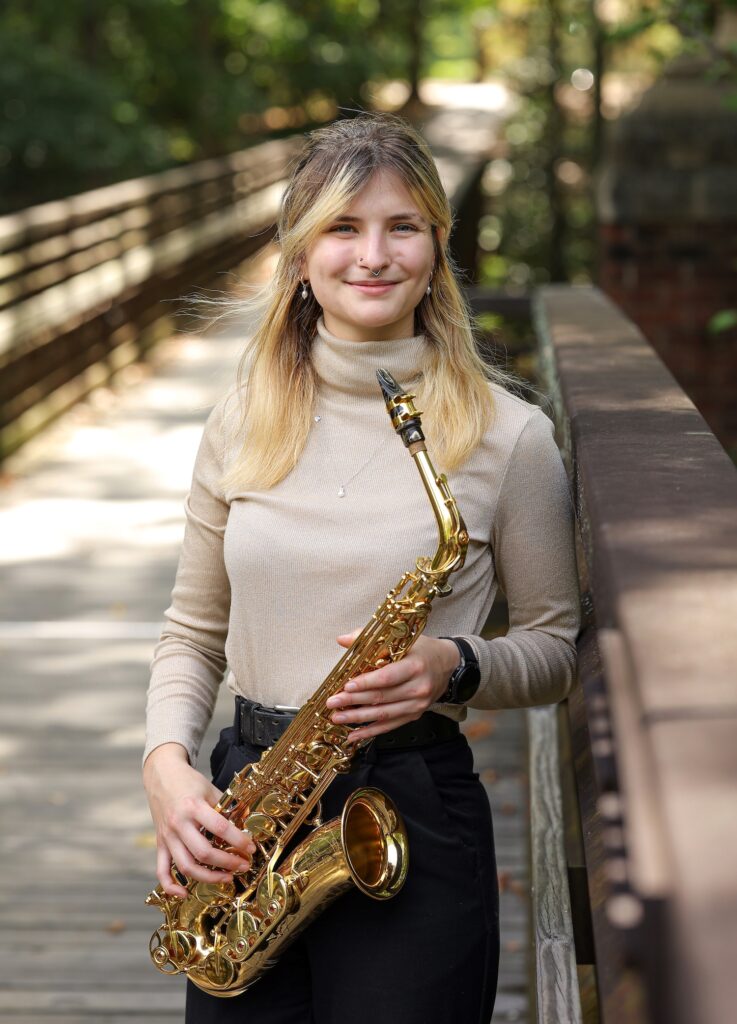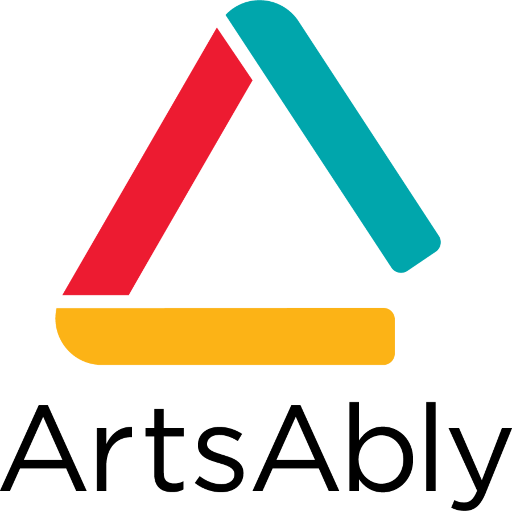Behind the scene
ArtsAbly was contacted by the saxophonist Alexia McLean, a RAMPD pro member, educator and member of the Committee on Gender Equity mentoring program in the North American Saxophone Alliance. One of her mentees, Rebecca Wirth, a third-year student studying saxophone performance at Furman University, developed a guide titled “Tuning Your Resilience: A Musician’s Disability Guide” for her community project. We contacted Rebecca to have more information. She shared the guide with us and answered a few questions. This page contains the interview, followed by the guide and accompanying resources.
Interview with Rebecca Wirth
Rebecca Wirth (she/her/hers), Furman University ’26, B.M. Saxophone Performance.

ArtsAbly: Who are you, what is your background, what is your story?
Rebecca Wirth: I am a saxophonist studying music performance at Furman University in Greenville, South Carolina. I am currently in my third year of study, performing soloistically and in various musical ensembles. I took piano lessons for a few years when I was a kid, but my passion for music took off once I picked up the saxophone. In my early teens, I started to experience issues with my physical health that affected my ability to play the saxophone, beginning with a series of lung injuries that recurred until my first year of college. Around the same time, I began to exhibit symptoms of chronic illness, which was undiagnosed at the time, but was affecting my daily life both on and off the saxophone. While these things can be difficult to navigate as a musician, they have taught me a great deal, and my appreciation for music has only grown over time. I am continuously inspired by the lifelong connections that music creates and the many wonderful communities that it has surrounded me with.
AA: Can you talk about your guide? What pushed you to write it, what does it contain, and why it is important?
RW: My experiences as a musician with chronic illness and several significant injuries throughout my life inspired me to write this guide. Trying to navigate these things with little guidance and the constant trial-and-error with learning to adapt to life and music again were very challenging for me. I’ve been through this process several different times, and it’s still difficult. When writing this guide, I wanted to focus mostly on the process of adapting to music again, and some of the biggest frustrations and roadblocks that can come along with it. I didn’t know what to expect the first time I got injured and was told that it was uncertain when my lungs would work well enough to play my saxophone again. I remember the frustration that came with trying to play the same instrument I had been playing for years, but having it feel completely different because my body no longer worked the way that it used to. I wrote this guide in the hopes of reaching out to someone who might be going through these things. The guide contains information about many different aspects of navigating injury, illness, or disability, and focuses on many of the challenges that come with it, as well as tools that might be helpful for musicians to use in navigating these things. I think that it is important to bring awareness to such topics, especially within the music community, so that a supportive environment can be fostered for all who participate in it. In my experience, there can be some pressure to hide injury, illness, or disability from other musicians, and I hope that continuing to talk about and accept that these things happen to so many people can alleviate some of that pressure.
AA: What does accessibility in the arts mean for you? or What does it mean for you to work in disability arts?
RW: I think that accessibility has gained more attention in the music community in recent years, which is a great thing! However, I think that there are still a lot of assumptions made about musicians, such as the idea that they must be in “good health” to participate in the field of music because it is so demanding. One manifestation of this assumption is the fact that there are still many performance venues that do not have an accessible stage. The attitude that musicians are required to conceal or “play through” the health issues they experience is dying down, but there is still a stigma that exists around these issues. It’s true that music is a physically demanding field, but it is also true that it can be adapted to fit the needs of each individual who participates in it. I think that accessibility in the arts means continuing to have conversations about improving performance practice and continuing to make the music community a space where people of all abilities are embraced.
Read the guide “Tuning Your Resilience: A Musician’s Disability Guide” by Rebecca Wirth
Ressources
Rebecca Wirth
Rebecca Wirth is a third-year student studying saxophone performance at Furman University. She was selected to participate in the North American Saxophone Alliance (NASA)’s Committe on Gender Equity mentoring program, where she worked with her mentor Alexia McLean to develop a guide for musicians navigating injury, illness, and disability. Rebecca attended NASA’s biennial conference in March 2024, where she shared her project as a part of a panel of mentees. She hopes to continue advocating for inclusion and awareness of musicians’ health as she continues her studies.
Read more about the CGE Mentoring Program and watch the mentees’ videos
Alexia McLean
Alexia McLean (she/her) is a saxophonist dedicated to closing equity gaps and enhancing inclusion in the music community. As an IDEA Arts Advocate and disability rights champion, she has advanced Inclusion, Diversity, Equity, and Accessibility in the music world, presenting at NASA Conferences. At LSU, Alexia founded the Diversity & Inclusion Student Organization and served as Faculty Advisor. She is a certified Safe Space Member and holds DEI and Inclusive Leadership certificates from the University of South Florida. Alexia implements initiatives in higher education, collaborating with administrators and career advisors to provide resources for student musicians. She recently organized Industry Day at Syracuse University.
RAMPD
RAMPD (Recording Artists and Music Professionals with Disabilities) est une plateforme professionnelle qui dote l'industrie de la musique et du spectacle vivant d'outils, de programmes et de stratégies favorisant l'intégration des personnes handicapées. RAMPD connecte également l'industrie à un répertoire mondial de créateurs de musique/son et de professionnels de l'industrie ayant un handicap, une neurodivergence et d'autres conditions chroniques ou de santé mentale, afin de trouver des sources et d'embaucher - apportant des opportunités compétitives, une visibilité et une communauté à nos membres professionnels tout en offrant l'inclusion du handicap aux partenaires de l'industrie/des lieux de spectacle. La mission du RAMPD est d'amplifier la culture du handicap, de promouvoir l'inclusion équitable et de plaider pour des espaces inclusifs et accessibles dans les industries de la musique et du spectacle vivant. Fondé en mai 2021 (et établi en janvier 2022) par l'artiste primé et activiste culturel Lachi, le RAMPD a vu le jour après qu'une discussion publique entre la Recording Academy et plusieurs artistes handicapés ait révélé le grave manque de visibilité, d'accès et de représentation pour les professionnels de la musique en situation de handicap.
